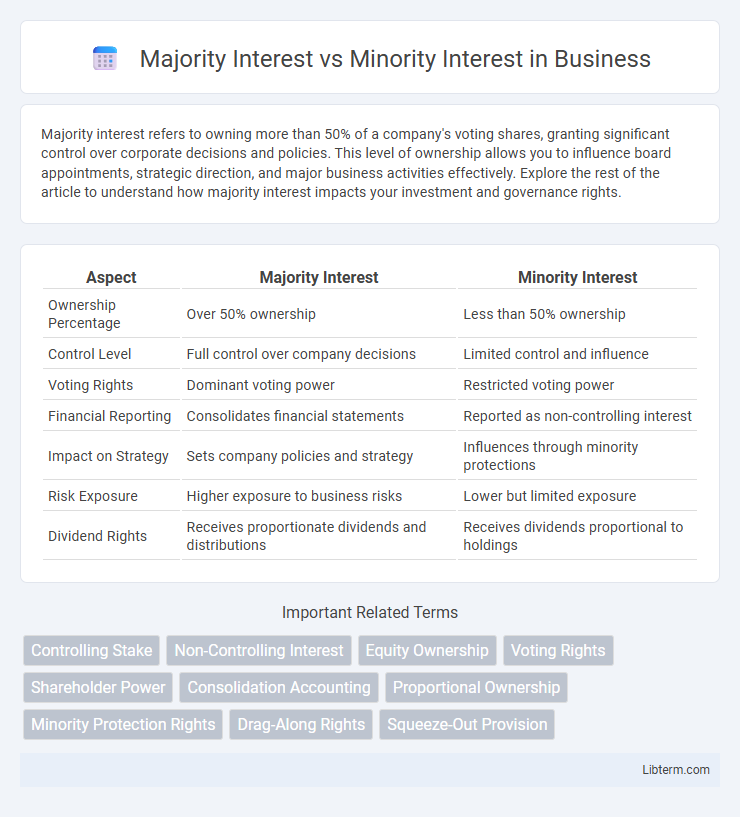Majority interest refers to owning more than 50% of a company's voting shares, granting significant control over corporate decisions and policies. This level of ownership allows you to influence board appointments, strategic direction, and major business activities effectively. Explore the rest of the article to understand how majority interest impacts your investment and governance rights.
Table of Comparison
| Aspect | Majority Interest | Minority Interest |
|---|---|---|
| Ownership Percentage | Over 50% ownership | Less than 50% ownership |
| Control Level | Full control over company decisions | Limited control and influence |
| Voting Rights | Dominant voting power | Restricted voting power |
| Financial Reporting | Consolidates financial statements | Reported as non-controlling interest |
| Impact on Strategy | Sets company policies and strategy | Influences through minority protections |
| Risk Exposure | Higher exposure to business risks | Lower but limited exposure |
| Dividend Rights | Receives proportionate dividends and distributions | Receives dividends proportional to holdings |
Understanding Majority and Minority Interest
Majority interest refers to ownership of more than 50% of a company's voting shares, granting control over corporate decisions and direction. Minority interest represents ownership of less than 50%, limiting influence on management but still providing claims on company profits and assets. Understanding majority and minority interest is essential for evaluating control dynamics, shareholder rights, and the impact on financial reporting and consolidation.
Key Differences Between Majority and Minority Interest
Majority interest refers to owning more than 50% of a company's voting shares, granting control over key decisions, while minority interest represents ownership of less than 50%, limiting influence on corporate governance. Majority interest holders can direct management policies and strategic initiatives, whereas minority interest holders typically have protective rights but lack decision-making power. Financially, majority interest impacts consolidation in parent company reports, whereas minority interest appears as non-controlling interest in equity, reflecting subsidiary ownership by external parties.
Rights and Powers of Majority Interest Holders
Majority interest holders possess significant decision-making authority, including control over corporate policies, voting on mergers, and appointing board members. Their rights enable them to influence major financial and strategic actions, shaping the company's direction and governance. Minority interest holders typically have limited power, relying on majority holders to act in the best interest of all shareholders.
Protections and Limitations for Minority Interest Holders
Minority interest holders possess specific protections such as rights to information, limited voting power, and sometimes rights to appoint board members to prevent oppression by majority shareholders. Limitations include reduced influence on key corporate decisions, vulnerability to dilution of shares, and often restricted access to strategic initiatives or dividends. Legal frameworks like shareholder agreements and minority shareholder rights laws are critical in balancing protection and limitations for minority interest holders.
Impact on Corporate Governance and Decision-Making
Majority interest holders wield significant influence over corporate governance, controlling board appointments and shaping strategic decisions due to their substantial voting power. Minority interest holders often face limited ability to influence management or policy changes, leading to potential challenges in protecting their rights and interests. Effective corporate governance requires balancing these dynamics to ensure accountability and equitable treatment of all shareholders.
Valuation Differences: Majority vs Minority Interest
Majority interest in a company typically holds controlling power, often valued with a control premium reflecting the ability to influence decisions, strategies, and dividend policies. Minority interest lacks this control, leading to discounts on valuation due to limited influence and increased investment risk. Valuation differences between majority and minority interests are critical in mergers and acquisitions, affecting price negotiations and shareholder value assessments.
Legal Implications of Majority and Minority Interest
Majority interest grants controlling power in corporate decisions, allowing the holder to influence board appointments, mergers, and dividend policies according to corporate governance laws. Minority interest holders possess limited influence but retain protections under minority shareholder rights, including the ability to challenge oppressive actions and demand fair treatment through legal remedies. Legal frameworks ensure majority shareholders cannot abuse their control by imposing fiduciary duties and providing mechanisms for minority shareholders to seek redress in cases of unfair prejudice or expropriation.
Minority Interest Buyouts and Exit Strategies
Minority interest buyouts involve acquiring the remaining shares held by minority stakeholders to gain full control over a company, often facilitating streamlined decision-making and strategic realignment. Exit strategies for minority investors typically include negotiated buybacks, third-party sales, or initial public offerings (IPOs), which provide liquidity while maximizing investment returns. Effective buyout agreements and clear valuation mechanisms are crucial for minimizing disputes and ensuring smooth ownership transitions.
Importance in Mergers and Acquisitions
Majority interest holds paramount importance in mergers and acquisitions as it grants the acquirer control over the target company's operations, strategic decisions, and financial policies. Minority interest represents the portion of equity not owned by the acquirer, affecting consolidation accounting and influencing earnings attribution. Proper valuation and management of both majority and minority interests ensure transparent financial reporting and fair stakeholder treatment during M&A transactions.
Best Practices for Managing Majority and Minority Interests
Effective management of majority and minority interests involves transparent communication and fair representation to balance control and protect stakeholder rights. Establishing clear governance structures and decision-making procedures minimizes conflicts and ensures equitable treatment of all shareholders. Regularly reviewing shareholder agreements and fostering collaborative dialogue promote trust and long-term partnership stability.
Majority Interest Infographic

 libterm.com
libterm.com